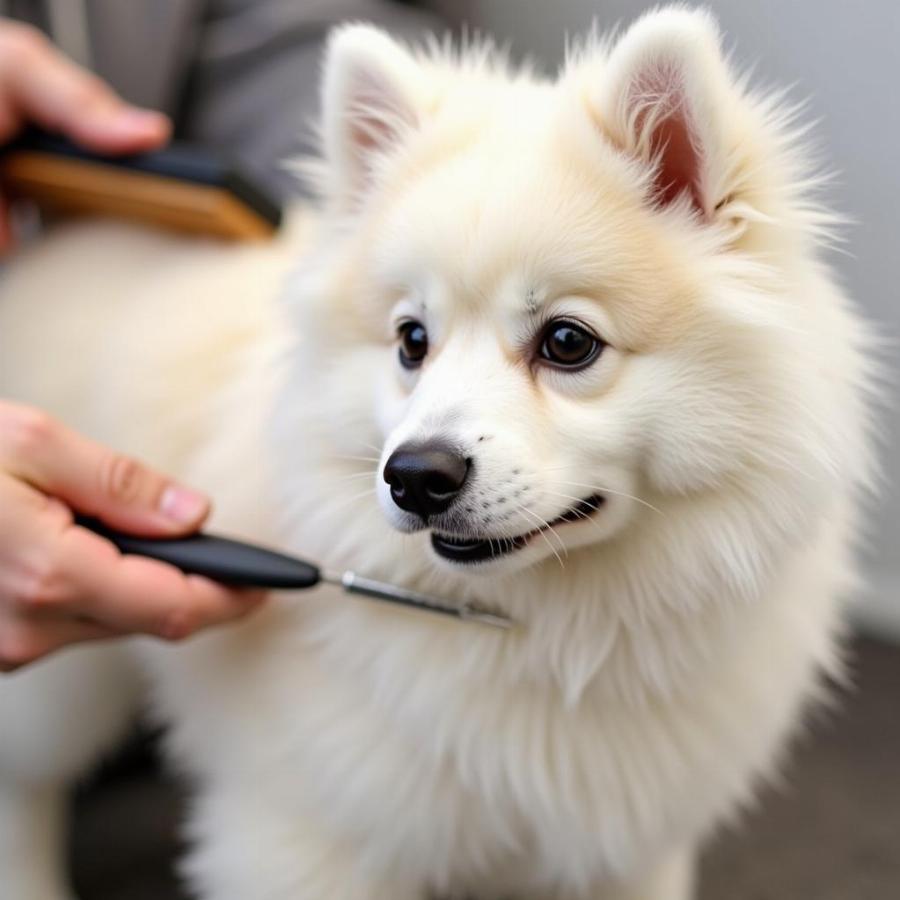The mini Samoyed dog is a sought-after companion for dog lovers who adore the stunning looks of the Samoyed breed but desire a more compact version. This comprehensive guide delves into everything you need to know about mini Samoyed dogs, from their temperament and care requirements to addressing common questions surrounding this “designer dog.”
Understanding the Mini Samoyed Dog
While the term “mini” suggests a standardized breed, it’s crucial to understand that mini Samoyed dogs are not officially recognized by major kennel clubs like the American Kennel Club (AKC). Instead, they are typically the result of crossbreeding a Samoyed with a smaller breed, often a Toy Poodle or Bichon Frise.
This breeding practice aims to produce a dog that embodies the Samoyed’s characteristic fluffy white coat, fox-like face, and friendly disposition, but in a smaller package. However, it’s important to note that the appearance and temperament of a mini Samoyed can vary depending on the specific breeds involved and even individual puppies within a litter.
Temperament and Personality
Mini Samoyeds are generally known for their affectionate and playful personalities. They often inherit the Samoyed’s gentle nature, making them suitable for families with children and other pets. They thrive on human companionship and love being involved in family activities.
However, their intelligence and energy levels mean that they need regular mental and physical stimulation. Without it, they can become bored and potentially destructive.
Expert Insight: “Mini Samoyeds are highly social dogs that crave interaction. They are not a breed that thrives being left alone for long periods,” says Dr. Emily Carter, a certified veterinary behaviorist.
Caring for Your Mini Samoyed Dog
Providing proper care for your mini Samoyed is essential for their overall health and well-being. Here are some key aspects to consider:
Exercise and Mental Stimulation:
Despite their smaller size, mini Samoyeds need a moderate amount of daily exercise. Aim for at least 30 minutes of walks or playtime. Engaging their minds with puzzle toys, obedience training, or interactive games is equally crucial to prevent boredom.
Grooming Needs:
Their beautiful double coat requires regular brushing to prevent mats and tangles. Expect to brush your mini Samoyed several times a week, if not daily, especially during shedding seasons. Regular baths help maintain their coat’s cleanliness and shine.
 Mini Samoyed Grooming
Mini Samoyed Grooming
Training and Socialization:
Early training and socialization are vital for mini Samoyeds. They are intelligent dogs but can be independent at times. Consistent, positive reinforcement methods work best. Exposing them to various people, dogs, and environments from a young age helps them develop into well-adjusted adults.
Health Considerations:
While generally healthy, mini Samoyeds can be prone to certain health issues, like their Samoyed parent breed. These may include:
- Progressive Retinal Atrophy (PRA): A degenerative eye condition that can lead to blindness.
- Hip Dysplasia: A condition affecting the hip joint, potentially causing pain and lameness.
- Hypothyroidism: A hormonal disorder that can lead to weight gain, lethargy, and skin problems.
Regular veterinary checkups, vaccinations, and parasite prevention are crucial for early detection and management of potential health concerns.
Finding a Mini Samoyed Dog
Finding a reputable breeder is paramount when considering a mini Samoyed dog. Responsible breeders prioritize the health and temperament of their dogs and are transparent about their breeding practices. Be cautious of breeders offering “teacup” or “micro” sizes, as these terms are often misleading and may indicate unethical breeding practices.
Expert Insight: “Never purchase a puppy without meeting the parents and seeing their living conditions. This helps ensure you are supporting responsible breeding,” advises Sarah Williams, a certified dog trainer and breeder.
FAQs about Mini Samoyed Dogs
1. How big do mini Samoyed dogs get?
While size can vary, mini Samoyeds typically reach a height of 12-17 inches and weigh between 15-35 pounds.
2. Do mini Samoyeds shed a lot?
Yes, like their Samoyed counterparts, they have a double coat that sheds moderately throughout the year and heavily during shedding seasons.
3. Are mini Samoyeds good apartment dogs?
They can adapt to apartment living if provided with sufficient exercise and mental stimulation.
4. How long do mini Samoyeds live?
The average lifespan is 12-15 years.
5. Are mini Samoyeds easy to train?
They are intelligent but can be independent, so consistent, positive reinforcement training is key.
In Conclusion
Mini Samoyed dogs can make wonderful companions for the right owners. Their charming looks, playful personalities, and affectionate nature make them an appealing choice. However, it’s essential to understand their needs, including their grooming requirements, exercise demands, and potential health concerns. By carefully considering these factors and providing proper care, you can enjoy many happy years with your mini Samoyed companion.
For further guidance on choosing the right breed for your lifestyle or addressing specific concerns about mini Samoyed dogs, don’t hesitate to reach out. Beaut Dogs is dedicated to providing reliable and insightful information to help you navigate the world of dog ownership.
Contact us at [email protected] for detailed and accurate answers to all your dog-related queries.
Beaut Dogs is your ultimate resource for trustworthy, comprehensive, and insightful information about the wonderful world of dogs. From breed guides to care tips and everything in between, we’re here to help you provide the best possible life for your canine companion. Visit us at https://beautdogs.com today!